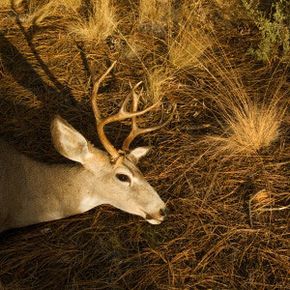The debate over hunting goes way back. While activists and sportsmen will probably be in dispute for years to come, there are steps being taken to make this sport as ethical as possible. That's the idea behind fair chase hunting.
According to Boone and Crocket, fair chase hunting is the ethical, sportsman-like, lawful pursuit, and taking of any free-ranging, wild, native North American big game animal that does not give the hunter an unfair advantage [source: Hunt Fair Chase]. In simpler terms, it means hunting without taking advantage of the animals and allowing them a fair chance to escape in defense.
Advertisement
Here are some of the basic rules of ethics that fair chase hunters live by:
- When hunting, obey all laws and regulations.
- When away from home, respect the land and customs of the locals.
- Adapt and follow a specific personal code that will bring out favorable abilities and sensibilities as a hunter.
- Never draw out the death of prey. Try to attain the best shot to make the kill as quick and precise as possible.
- Keep the personal code in mind and let it dictate behavior. It is the responsibility of the hunter not to dishonor the hunter, the hunted or the environment [source: Hunt Fair Chase].
The ethical approach also states that a hunter may not take an animal if:
- The hunter herded or spotted the animal from air and then quickly landed to pursue.
- It was herded or chased by a motorized vehicle.
- Electronic communication devices are being used.
- It is confined by artificial barriers or transplanted for commercial shooting.
- It is trapped or drugged.
- It's swimming, trapped in snow or helpless in any nature.
- The hunter is using another hunter's license.
- Laws or regulations are being broken [source: Hunt Fair Chase].
Read on to learn about both sides of the fair chase hunting debate.
Advertisement



